The recently-introduced Second Amendment Sanctuary Act isn’t all that novel, and may need different enforcement mechanisms if it’s to succeed. This, according to Tennessee Firearms Association Executive Director John Harris. In interviews with The Tennessee Star, Harris and State Representative Scotty Campbell (R-Mountain City) discussed the merits and shortcomings of Campbell’s latest gun rights bill.
Harris predicted that this legislation would fail to fix the original problem presented in a nearly-identical bill signed into law in 2015. He added that another similar bill, the Firearms Freedom Act – made law in 2009 in response to President Barack Obama taking office – affords a similar defense against federal government actions, though he noted that enforcement of those two laws hasn’t occurred.
“This is a Tenth Amendment issue as much as a Second Amendment issue. They just sort of withered under the Obama Administration. In their flurry to pass [these laws], states didn’t do much about putting enforcement mechanisms in them,” stated Harris.
Harris suggested that the legislation take a different direction entirely by flat-out refusing to adjudicate the constitutionality of federal government orders, regulations, or laws concerning the Second Amendment. Instead, he argued that legislative focus should only be on making the federal government enforce its own laws through its own means. Harris referenced a U.S. Supreme Court case from the late 1990s, Printz v. United States, which established the precedent that the federal government can’t coerce states to implement regulatory programs.
“[The act is] just a restatement of previous bills,” stated Harris. “Conceptually, what they ought to be doing is taking the ‘none of the federal laws will be enforced with any state laws’ period.”
Following initial coverage from The Star on Thursday, Campbell acknowledged to The Star that the legislation would require additional language to fortify its intended impact.
“We are working on improving HB0928 to specifically detail the process to determine whether or not an executive order or federal law is in violation of the Constitution,” stated Campbell. “The bill as drafted has not established the process and we hope to through an amendment. I think the bill, as written, would help us in the event of future court challenges. The judges would be aware of the intention of the code section. This would create Tennessee’s position on such unconstitutional terms.”
Campbell clarified that, at this point, the bill serves as a blanket mandate and doesn’t establish a judicial review or committee. It will be up for future discussion on amendments to determine what interpretations of constitutionality may be included within the act. The clarification on Second Amendment constitutionality, Campbell said, will inform the courts that Tennessee shouldn’t comply with the federal government on that issue.
“Here’s what we have: it will draw the line in the sand on Tennessee’s position,” stated Campbell. “Some people say this is about politics – this is all about the judicial system. We’re trying to protect ourselves with our Tenth Amendment rights and our constitutional rights.”
On another note, Harris opined that the labeling the bill as a “sanctuary” poses another issue. He referenced the reliance on the term by cities that refuse to enforce federal immigration laws, like Santa Ana in California. He noted that the move by Virginian cities several years ago to declare themselves sanctuary cities against red flag laws initiated the idea for others to declare themselves similar sanctuary cities. Harris argued that this understanding of the term is mistaken.
“The sanctuary concept came from the progressive left through the states that had mainly cities that refused to enforce drug laws – like pot or marijuana – or refused to enforce valid immigration laws,” stated Harris. “It’s not really fair or important to call it a ‘sanctuary’ because it concedes the federal government has the authority to pass it – we [as a state] should just say we don’t care.”
Campbell disagreed. He told The Star that their use of the term “sanctuary” coincides with both constituent support and precedent in state and nationwide.
“I’m using a phrase that’s well-branded and well-stated in our state and our country,” asserted Campbell. “It lets [the federal government] know where we stand – just like the majority of Tennessee counties have wanted.”
At least 59 out of 95 counties, 2 cities, and 1 town have adopted Second Amendment sanctuary or pro-Second Amendment resolutions.
Last summer, a bill to make Tennessee a sanctuary state died in committee after passage in the House.
– – –
Corinne Murdock is a reporter at The Tennessee Star and the Star News Network. Follow her latest on Twitter, or email tips to [email protected].
Photo “John Harris” by NewsChannel 5. Background Photo “Gun Show” by M&R Glasgow. CC BY 2.0.






All firearms “laws” are Unconstitutional since the Bill of Rights was accepted. To that end Tennessee should not only tell the federal government “we will not comply” with new “laws” but we should no longer observe or obey the old ones either.
To that end Tennessee should allow the free trade and sale of firearms without the 4473 form which is being used to compile an illegal federal gun owner registry.
Tennessee should no longer honor the NFA banned items list as well.
Tennessee should no longer require any form of permitting system for the exercise of your Right to carry a firearm. The fees these require are illegal as they are turning a Right into a Privilege by adding a fee.
Tennessee should also declare that any federal forces who attempt to enforce Unconstitutional “laws” on Tennessee residents will face criminal charges of illegal detention, kidnapping, civil rights violation, illegal seizure of private property, and the list goes on. If they attempt to act against any Tennessee resident whether they be in the state of Tennessee at the time or not.
If Tennessee would act to protect lawful citizens from the overreach of the federal injustice system, and take actions to actively oppose illegal and unjust laws it would go a long way in restoring the actual freedoms America was founded on.
If our legislators are that concerned about the Second Amendment, maybe they should read it. “Shall no be infringed” means we don’t need the State’s permission, through licensing, to carry a gun for self-protection. When do we get our 2A natural born right entered into our State Constitution?
Right John R!
And our State Legislators should READ Article I,Section 26 of the Tennessee Constitution Declaration of Rights. We have a Citizens’ DECLARED RIGHT to keep and bear (carry) arms for self defense. In that article, the Legislature is only delegated power “for the WEARING of arms with a view to prevent crime,”,that is, requiring how you wear what you carry, something like a pistol must be holstered or a sling for your rifle. It is UNLAWFUL to require a permit, payment or anything to exercise a right!
Furthermore, the Federal Government has NO delegated power enumerated in the Constitution for gun laws pertaining to the People. So according to the 10th Amendment ALL Federal gun laws that apply to the People of “Free States”are UNLAWFUL and therefore “null and void “ , particularly according to SCOTUS precedent in the 1803 Marburg vs Madison.
“All laws which are repugnant to the Constitution are null and void.” ―First U.S. Supreme Court Chief Justice, John Marshall, Marbury v. Madison (5US137, 176; 1803)
Today would be a good time to do so.